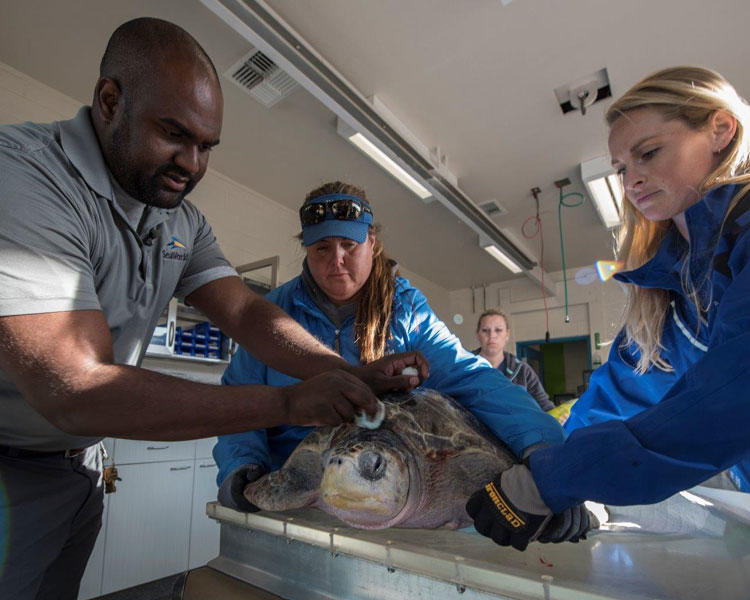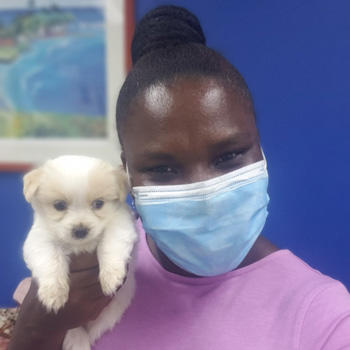Have you always wanted to work with animals and their owners? You’re outgoing and empathetic, and at the same time, you have a mind for business. Managing a budget, running reports, and hiring and managing staff all appeal to you. If you’re not afraid to make tough financial decisions, put in some extra elbow grease, and sometimes act as a shoulder to cry on while tending to all the clinical needs of your patient population, then owning a veterinary practice may be your calling.
Ross Vet alumnus, Dr. Kristina Yee ’06, DVM, and owner of Hometown Veterinary Hospital, LLC knew as a teenager that a career in veterinary medicine was in her future. “At the age of 15,” she says, “I applied to local veterinary hospitals soliciting myself as a sanitation engineer. When a local practice contacted me, I began cleaning the practice at the end of the day in exchange for exposure/experience to the veterinary practice. Veterinary school did a great job of providing me with the fundamental skills and knowledge required to be a great practitioner. Attending Ross gave me invaluable clinical skills as well as personal skills such as patience, problem-solving, multitasking, communication, and resiliency.”
How to start your own veterinary practice is not typically part of the curricula in veterinary school and is instead, primarily focused on developing clinical skills through prescribed coursework. Says Yee, “Generally, veterinary curricula aren’t focused on business ownership. The majority of my preparation came from life experiences and networking. Following graduation, I became a field veterinarian for Nationwide (yes, the insurance company) which has provided me with the opportunity to speak at veterinary schools on topics like business management, revenue, and insurance via each schools’ student-run VBMA (Veterinary Business Management Association). As a new practice owner, taking care of animals takes up about 40% of my time, taking care of the business is a 60% commitment.”
What to Expect When Starting a Veterinary Practice
Most veterinarians recognize their passion for animals and this career early in life. Adds Yee, “That same passion is helpful for those who wish to be entrepreneurial. While anyone can own a practice, it’s not for the faint of heart. Leadership, decision making, conflict resolution, comfort with finances, time management, and communication skills are highly recommended.”
“As an owner,” she adds, “a veterinarian should be able to accomplish every task in a practice which may include reception, assistant, technician and veterinarian. It doesn’t mean he or she should be doing those tasks, but to contribute at times can build great confidence, camaraderie, and credibility among team players. It’s helpful to wear all these hats plus be able to fix a toilet, configure a network, mop a floor and so much more! While a practitioner typically doesn’t work a 9-5 workday, a new practice owner definitely should expect long hours.”
Ross Vet alum Dominic Andreoli ’88, DVM, and owner of private veterinary practice in Naples, Florida, is now winding down his career after recently selling his practice.
Andreoli says, “I think for me the defining moment was shortly after graduation and passing the boards that it became ‘real’. I had always wanted to become a veterinarian. So going into private practice wasn't a huge leap.”
A longtime companion animal veterinary practice owner Andreoli stresses the importance of building the skills required to run a business. He says about owning a veterinary practice, “I strongly recommend accounting, business law, employment law, contracts, and negotiating. Plus, I recommend communications, both verbal and written, and veterinary law with close attention to records and record-keeping.”
Dr. Andreoli grew up around horses and took opportunities to see what small animal medicine was about. “My initial thought was to get into equine medicine. But after finishing my degree, I became more interested in small animal medicine and surgery.”
Dr. Andreoli’s pathway to practice involved working every case he could in clinical, and then he worked for a private vet for about 6 months. “During that time,” he says, “I applied and received business loans and designed my first practice to be as efficient as possible. I launched my business shortly thereafter.”
Owning a Veterinary Practice-A Typical Day
For Andreoli, the days are long, varied, and rewarding. “When I started working,” he says, “my typical day began around 7 am and included a review of hospital cases, records, and client callbacks. I’d start seeing clients at 8 am and go until about 6 pm, leaving time open in the middle of the day for surgeries and hospital cases. In the evening, there would be records and callbacks. Sometimes, I would do rounds in the evenings as well. I did this Monday through Friday and half days on Saturdays. Plus, I was in and out on weekends for emergency services or cases that needed my attention.”
Over a long career, Dr. Andreoli has had the opportunity to contribute to important studies. He relates, “I worked for a while in feline research regarding the aids vaccine. We were using the leukemia disease model for research in human medicine.”
Another time he adds, “I was able to assist in the initial research for heartworm preventatives involving case studies for the pro-Hart injectable. I've been a believer that most of the research done in veterinary medicine in one way or another translates over to human medicine. I have been on both sides of the fence — human medicine and veterinary medicine. The two are quite related.”
What would you advise anyone planning on a private practice career?
“First, enjoy your veterinary education as much as possible and try to maintain close friendships- they will last a lifetime. Learn as much as you can, especially in clinics, so that you can take that knowledge with you to accelerate the learning curve when you get into private practice. Most importantly, do not lose sight of the reason you became a veterinarian. Try to keep empathy for those whose animals you serve and realize that what you are doing is a privilege and not a right.”
How to start a veterinary practice- 5 tips every private practice veterinarian needs to know
- Know your market: How large is the community you intend to serve? How many companion animals are there in a given year? What does the competitive landscape look like? Is there room for you to grow your business? For answers to these questions, you can use tools like the AVMA Market Share Estimator. This is a great way to evaluate the potential opportunity and devise a strategy.
- Brush up on your record-keeping: The AAHA/VMG Chart of Accounts is free for all practicing veterinarians. This allows you to do essential accounting, such as tracking bills and payments. It’s the best-practice accounting standard for classifying revenue, expense and balance sheet accounts.
- Tools to strengthen your veterinary team: Once again, the AVMA offers a vital toolkit to provide vet practices with the most relevant and current HR policies.
- Use marketing to cement client loyalty: On this site, you’ll find a host of tools and resources that veterinarians can use to keep customers coming back — everything from how to use social media, online reputation management to client education materials.
- Leverage your communication skills and those of your colleagues: During the COVID-19 pandemic, telemedicine has become an important tool for both human physicians and veterinarians. Whether to check on a patient’s progress, take input from a pet owner, or to prescribe medications, this platform may serve you well.
There’s a lot to keep in mind when you think about owning a veterinary practice. Take plenty of time to research and prepare.
See yourself as a veterinarian?








